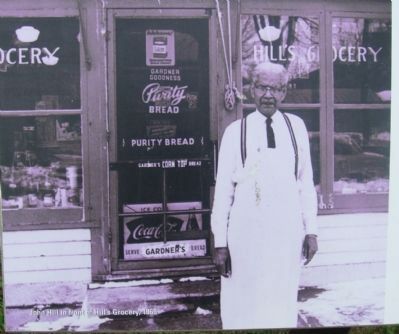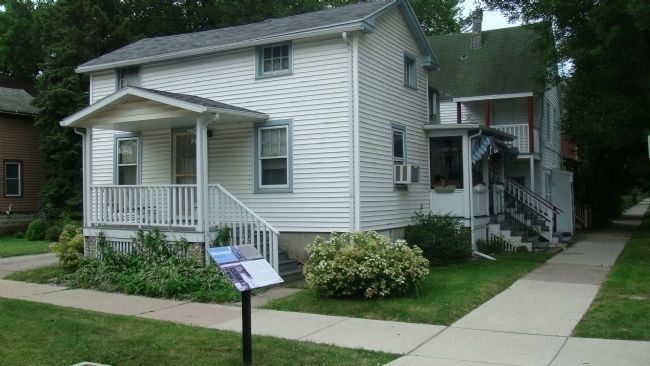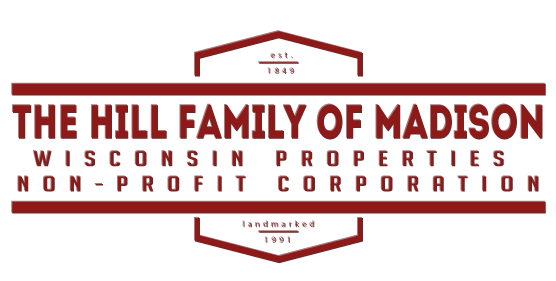Here was Madison’s first African-American Neighborhood
The Madison Heritage Series
John Hill first set eyes on Madison while visiting a relative who was attending the University of Wisconsin. He moved his family here from Atlanta in 1910 to join a modest community of about 140 African Americans.
JOHN W. HILL, GROCER

Photographer: William J. Toman
The Hill properties were originally owned by John Turner (1849-1909), a former slave from Kentucky, and his wife, Martha. Turner organized the Douglass Beneficial Society, a self-help organization, based on the teachings of Frederick Douglass. Turner also founded the Community’s first Sunday school. He provided a meeting place for the Beneficial Society by moving a two-story building from downtown Madison, to its current site at 649 E. Dayton Street.
In 1917, Hill bought the Turner house with attached grocery store at Dayton and Blount streets from Reverend Charles Thomas, pastor of St. Paul’s African Methodist Episcopal Church. Thomas had purchased the building, formerly used as a boarding house and meeting hall, from civic leader John Turner.
John and Amanda Hill operated Hill’s Grocery for more than 50 years. Their daughter, Freddie Mae, was the UW’s first African-American graduate. Their neighbors included the Miller family, who worked to improve the lives of African-Americans in the city, and Benjamin Butts, a former slave liberated by Wisconsin troops during the Civil War. The Hill building has been designated a Madison landmark for its rich cultural history.
Here was Madison’s first African-American neighborhood Marker

Photographer: William J. Toman
Churches have played a vital role in African-American neighborhoods, offering community, shared worship and mutual assistance. Founded in 1902, the St. Paul African Methodist Episcopal Church By William J. Toman, July 4, 20102. Closeup of John Hill Photo on Markeris one of the oldest African-American congregations in Wisconsin. Organizers bought the original building from a Norwegian congregation and moved it to land donated by founding member William Miller at 631 East Dayton Street. One pastor of the church supplemented his meager wages by opening a grocery nearby, later selling it to church trustee John Hill. Hill’s Grocery became a neighborhood institution, operated by a single family longer than any other grocery store in Madison.
Erected 2006 by City of Madison.
This historical marker is listed in these topic lists: African Americans • Churches & Religion. In addition, it is included in the African Methodist Episcopal (AME) Church
Location. 43° 4.869′ N, 89° 22.738′ W. Marker is in Madison, Wisconsin, in Dane County. Marker is at the intersection of East Dayton Street and North Blount Street, on the right when traveling east on East Dayton Street. Touch for map. Marker is at or near this postal address: 120 North Blount Street, Madison WI 53703, United States of America. Touch for directions.
Other nearby markers. At least 8 other markers are within walking distance of this marker. Thomas / Hill Grocery and Residence (here, next to this marker); Miller House (a few steps from this marker); Badger State Shoe Factory (within shouting distance of this marker); City Horse BarnBy William J. Toman, July 4, 20103. Here was Madison’s first African-American neighborhood MarkerThe John Hill house is just behind the marker, with the former Hill’s Grocery building attached on the right. The Miller house is just beyond the former Hill’s Grocery building.(within shouting distance of this marker); City Market (within shouting distance of this marker); Anna and Cornelius Collins Residence (about 700 feet away, measured in a direct line); Irene and Robert Connor Residence (about 700 feet away); Collins House (approx. 0.2 miles away). Touch for a list and map of all markers in Madison.
More about this marker. This marker is part of the Madison Heritage Series, Sharing Our Legacy, created for Madison’s sesquicentennial. The marker was sponsored by the Madison Community Foundation and Madison Gas & Electric.
Regarding Here was Madison’s first African-American neighborhood. According to the Madison Landmarks Commission, which designated the John Hill house and Hill’s Grocery as landmarks (no. 96) in 1991, “The two vernacular buildings [ca. 1850; moved 1901 and 1912] on this site [120 N. Blount Street and 649 E. Dayton Street] represent one of the last vestiges of Madison’s first African-American community. The two-story commercial building was moved here in 1901 by African-American civic leader, John Turner, to provide a meeting place for the Douglass Beneficial Society. The house was moved here in 1912 to serve as living quarters for the pastor of the nearby St. Paul A.M.E. Church. John W. Hill purchased the property in 1917 and operated a grocery store here until around 1980.”

Here was Madison’s first African-American neighborhood Marker. The John Hill house is just behind the marker, with the former Hill’s Grocery building attached on the right. The Miller house is just beyond the former Hill’s Grocery building.
By William J. Toman, July 4, 2010
Your much appreciated donations and/or contributions shall be given to the Foundation(s) of your choice. Otherwise, your donations and contributions shall be distributed among all Foundations. If you wish that your donation be specifically used for restoration of the Hill Family Historical Legacy properties, please, indicate that when you donate and contribute.
Pursuant to the Internal Revenue Code, Section 501(c)(3), your donations, or contributions to THE HILL FAMILY OF MADISON, WISCONSIN PROPERTIES NON-PROFIT CORPORATION, are tax deductible. Nondeductible Items, however, are amounts paid for raffle tickets, or, to play bingo, or, other games of chance. All Purchases and Contributions made online, are made, securely. Your Purchase of Raffle Tickets, or Any Contributions, Shall Be Used To Support The Hill Family Properties’ Non-Profit Corporation, and Scholarship Foundations. A Financial Statement Of The Charitable Organization Disclosing Assets, Liabilities, Fund Balances, Revenue, And Expenses For The Preceding Fiscal Year, Will Be Provided To Any Person, Upon Request.” Please, write to: The Hill Family Properties of Madison, Wisconsin Non-Profit Corporation, 649 East Dayton Street, Madison, Wisconsin 53703.
